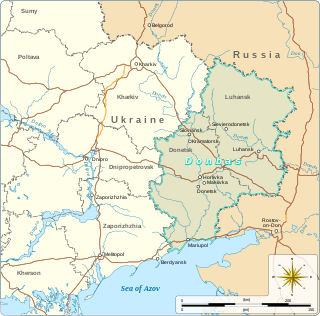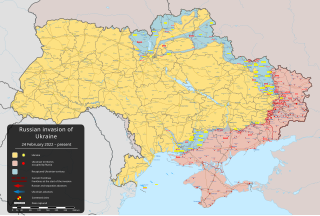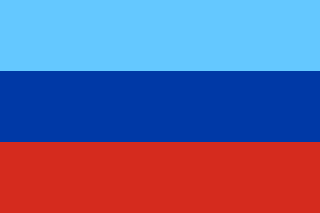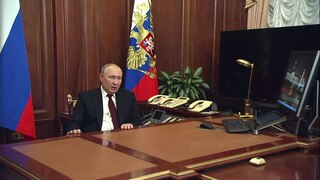This article is being considered for deletion in accordance with Wikipedia's deletion policy. Please share your thoughts on the matter at this article's deletion discussion page. |
Ukrainian crisis may refer to:

Ukraine is a country in Eastern Europe. It is the second largest country in Europe after Russia, which borders it to the east and north-east. Ukraine also shares borders with Belarus to the north; Poland, Slovakia, and Hungary to the west; Romania and Moldova to the south; and has a coastline along the Sea of Azov and the Black Sea. It covers about 600,000 km2 (230,000 sq mi), with a population of about 40 million. The nation's capital and largest city is Kyiv.

Vladimir Vladimirovich Putin is a Russian politician and former intelligence officer who is the president of Russia, a position he has filled since 2012, and previously from 2000 until 2008. He was also the prime minister from 1999 to 2000, and again from 2008 to 2012. Putin is the second-longest currently serving European president after Alexander Lukashenko of Belarus.

Viktor Fedorovych Yanukovych is a Ukrainian statesman and former politician who served as the fourth president of Ukraine from 2010 until he was removed from office in the Maidan Revolution in 2014, after a long series of European Union supported protests by diverse civil-society groups. From 2006 to 2007 he was the prime minister of Ukraine; he also served in this post from November 2002 to January 2005, with a short interruption in December 2004.

Sergey Viktorovich Lavrov is a Russian diplomat and politician who has served as the Foreign Minister of Russia since 2004. As a member of the United Russia party, he served as the Permanent Representative of Russia to the United Nations from 1994 to 2004. Lavrov is under personal sanctions in the European Union, the United Kingdom, the United States, Canada and Australia for his role in the 2022 Russian invasion of Ukraine.

The Donbas or Donbass is a historical, cultural, and economic region in southeastern Ukraine. Parts of the Donbas are controlled by separatist groups as a result of the Russo-Ukrainian War: the Donetsk People's Republic and the Luhansk People's Republic. The word Donbas is a portmanteau formed from "Donets Basin", an abbreviation of "Donets Coal Basin". The name of the coal basin is a reference to the Donets Ridge; the latter is associated with the River Donets.

Victoria Jane Nuland is an American diplomat currently serving as Under Secretary of State for Political Affairs. Nuland, a former member of the foreign service, served as the Assistant Secretary of State for European and Eurasian Affairs at the United States Department of State from 2013 to 2017 and US Permanent Representative to NATO from 2005 to 2008. She held the rank of Career Ambassador, the highest diplomatic rank in the United States Foreign Service. She is the former CEO of the Center for a New American Security, (CNAS), serving from January 2018 until early 2019, and is also the Brady-Johnson Distinguished Practitioner in Grand Strategy at Yale University, and a member of the board of the National Endowment for Democracy. She served as a nonresident fellow in the foreign policy program at the Brookings Institution and senior counselor at the Albright Stonebridge Group.

Russia–Ukraine relations refer to the bilateral ties between the Russian Federation and Ukraine. Following the Ukrainian Revolution of Dignity in 2014, Ukraine's Crimean Peninsula was occupied by unmarked Russian forces, later being annexed by Russia, while pro-Russia separatists simultaneously engaged the Ukrainian military in an armed conflict for control over eastern Ukraine; these events marked the beginning of the ongoing Russo-Ukrainian War. In a major escalation of the conflict on 24 February 2022, Russia launched a full-scale invasion of the Ukrainian mainland across a broad front, causing Ukraine to sever all formal diplomatic ties with Russia.

The Russo-Ukrainian War is an ongoing war between Russia and Ukraine. It began in February 2014 following the Ukrainian Revolution of Dignity, and initially focused on the status of Crimea and parts of the Donbas, internationally recognised as part of Ukraine. The first eight years of the conflict included the Russian annexation of Crimea (2014) and the war in Donbas (2014–present) between Ukraine and Russian-backed separatists, as well as naval incidents, cyberwarfare, and political tensions. Following a Russian military build-up on the Russia–Ukraine border from late 2021, the conflict expanded significantly when Russia launched a full-scale invasion of Ukraine on 24 February 2022.

The 2014 anti-war protests in Russia refers to a series of anti-war demonstrations opposing the Russian military intervention in Ukraine that took place in Russia in 2014. Protesters held two anti-war protest rallies on 2 and 15 March 2014. The latter, known as the March of Peace, took place in Moscow a day before the Crimean referendum. The protests have been the largest in Russia since the 2011–13 Russian protests by the Russian opposition against the alleged electoral fraud committed by United Russia during the 2011 Russian legislative election. Reuters reported that around 20,000 people participated in the 15 March demonstrations.

The Support for the Sovereignty, Integrity, Democracy, and Economic Stability of Ukraine Act of 2014 is an American Act of Congress that provides Ukraine with loan guarantees of up to $1 billion in response to the 2014 Russian military intervention in the country.

The Donetsk People's Republic is a self-proclaimed breakaway state located in Ukraine, formed on 7 April 2014. The capital city and largest city within the DPR is Donetsk. Denis Pushilin has served as the DPR head of state since 2018.

The Luhansk People's Republic, also known as the Lugansk People's Republic, is a self-proclaimed breakaway state located within Ukraine, designated as a terrorist organisation in Ukraine. It is located in Luhansk Oblast in the Donbas region, a territory internationally recognised, with the exception of the Russian Federation, to be a part of Ukraine. Luhansk, the territory's largest city, serves as its capital. The population of the republic is approximately 1.5 million people. The current head of state is Leonid Pasechnik.

The Azov Special Operations Detachment, also known as the Azov Regiment or Azov Battalion until September 2014, is a neo-Nazi unit of the National Guard of Ukraine based in Mariupol in the coastal region of the Sea of Azov. Azov formed as a volunteer paramilitary militia in May 2014, and has since been fighting Russian forces in the Donbas War. It first saw combat recapturing Mariupol from Russian forces and pro-Russian separatists in June 2014. It initially operated as a volunteer police company, until it was formally incorporated into the National Guard on 11 November 2014. In the wake of the 2022 Russian invasion of Ukraine, the battalion gained renewed attention for its use by Russia in justifying the invasion and during the Siege of Mariupol for its role in the defense of the city.

International sanctions have been imposed during the Russo-Ukrainian War by a large number of countries against Russia and Crimea following the Russian invasion of Ukraine, which began in late February 2014. Belarus has also been sanctioned for its cooperation with and assistance to Russian armed forces. The sanctions were imposed by the United States, the European Union (EU) and other countries and international organisations against individuals, businesses and officials from Russia and Ukraine. Russia responded with sanctions against several countries, including a total ban on food imports from Australia, Canada, Norway, Japan, the United States and the EU.
Russian invasion may refer to:

Special Group "Alpha" is an elite Ukrainian Spetsnaz group, branch of the Security Service of Ukraine; and a successor of the Soviet Union's Alpha Group. Group Alpha is one of the top divisions of the special forces of Ukraine.

Information war has been described as "the use of information to achieve our national objectives." According to NATO, "Information war is an operation conducted in order to gain an information advantage over the opponent." The contest widely described as an information war between Russia and Ukraine is not symmetric, except as each side tries to gain "information advantage."

Russia invaded Ukraine on 24 February 2022. Internationally considered an act of aggression, the invasion has triggered Europe's largest refugee crisis since World War II, with more than 4.3 million Ukrainians leaving the country and a quarter of the population displaced.

The economic impact of the 2022 Russian invasion of Ukraine began in late February 2022, in the days after the Russian Federation recognized two break-away republics and attacked Ukraine. The subsequent economic sanctions have targeted large parts of the Russian economy, Russian oligarchs, and members of the Government of Russia. Russia has responded with sanctions of its own. Both the conflict and the sanctions have had a strongly negative impact on the world economic recovery during the ongoing COVID-19 recession. Estimates of a 30-year economic setback have been projected, for Russia, as a result of entering the war.

"Address concerning the events in Ukraine" was a televised address by Russian President Vladimir Putin on 21 February 2022, announcing that the Russian government would recognise the Ukrainian separatist regions of the Donetsk People's Republic and the Luhansk People's Republic as independent. During the speech, Putin also made a number of claims regarding Ukrainian history and Ukrainian domestic politics. The speech, which marked a significant escalation in the 2021–2022 Russo-Ukrainian crisis, was followed three days later by the speech declaring "a special military operation" in Ukraine—the 2022 Russian invasion of Ukraine.